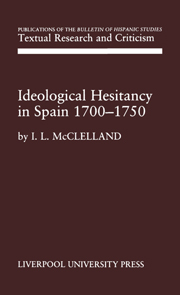Book contents
- Frontmatter
- Contents
- Dedication
- Preface
- CHAPTER 1 Reason of Unreason in the Spanish Vulgo
- CHAPTER 2 The False Alarm of ‘Scepticism’
- CHAPTER 3 The Vulgo-Conception of Scientific Evidence
- CHAPTER 4 The Psychological Significance of Pulpit Oratory
- CHAPTER 5 Witness of the Popular Stage
- CHAPTER 6 The Disturbing Effects of the Periodical Press
- Index
CHAPTER 4 - The Psychological Significance of Pulpit Oratory
- Frontmatter
- Contents
- Dedication
- Preface
- CHAPTER 1 Reason of Unreason in the Spanish Vulgo
- CHAPTER 2 The False Alarm of ‘Scepticism’
- CHAPTER 3 The Vulgo-Conception of Scientific Evidence
- CHAPTER 4 The Psychological Significance of Pulpit Oratory
- CHAPTER 5 Witness of the Popular Stage
- CHAPTER 6 The Disturbing Effects of the Periodical Press
- Index
Summary
‘… how many more people there are that see and hear than think and judge’
(Colley Cibber, Life).Related only incidentally to major surveys of the new meaning of reason in Philosophy and Science, but of prime emotional concern to the vulgo, was an intellectual re-appraisal of the quality and manner of religious preaching. Ridiculous as Baroque whimsy in matter, and theatricality in mannerism, might begin to seem to a rationalistic intelligentsia, it had expressed a state of mind as justifiable in its historical context as was that of plain-speaking representatives of Enlightenment. The exteriorization of a complexity of mental bewilderment raised by the Renaissance question ‘What is reality?’ took various outer forms. One was a display of imaginative suggestion, an elaborate conversion, into ever more elaborate figures of speech, of the epoch's sense of elaborate confusion: a form beloved of literary artists who were not obliged to find definite answers. Another, eventually, was an activity of practical detection, inductive reasoning, and scientific plainspokenness, as exemplified in Bacon, Newton, Descartes, Locke, Leibnitz, Mayáns y Siscar, Feijoo, and their like. Paradoxical ideas, or thought-provoking ornateness, made fashionable by Cervantine or Quevedan genius respectively, were debased by ungifted imitators. Fashionably plain, blunt speech, when used by ungifted men could become, from the literary standpoint, banal and lifeless. But that does not mean that inferior forms of expression, whether inartistically exuberant or banal, were necessarily unrelated to realistic thinking.
- Type
- Chapter
- Information
- Ideological Hesitancy in Spain 1700-1750 , pp. 86 - 120Publisher: Liverpool University PressPrint publication year: 1991



